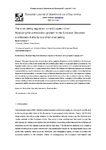The Short Selling Regulation in the EU: Assessing the Authorization Granted for ESMA to Prohibit Short Selling

View/
Use this link to cite
http://hdl.handle.net/2183/23445Collections
Metadata
Show full item recordTitle
The Short Selling Regulation in the EU: Assessing the Authorization Granted for ESMA to Prohibit Short SellingAuthor(s)
Date
2017Citation
Huhtilainen, M. (2017). The Short Selling Regulation in the EU: Assessing the Authorization Granted for ESMA to Prohibit Short Selling. European Journal of Government and Economics, 6(1), 5-23. https://doi.org/10.17979/ejge.2017.6.1.4321
Abstract
[Abstract] This paper discusses the renewed short selling regulation (Regulation (EU) No 236/2012) in the European Union. The focus is on the provisions that deal with prohibiting short selling in exceptional market circumstances. The Regulation further enforces certain obligations to report and disclose short positions. It is concluded that banning short selling is not an effective tool to contain extreme price volatility. The difference-in-differences regression and repeated measures GLM were used to test whether short selling bans were successful in containing volatility of those Spanish and Italian stocks that were subject to two back-to-back prohibitions during the years 2011-2013. The results are consistent with the majority of previous research, suggesting that the effectiveness of short sale constraints in reducing volatility is limited at best. Furthermore, there are evidence of counterproductive effects: constraints on short selling may actually increase volatility as well as deteriorate liquidity. However, based on theory and previous studies, reporting and disclosure requirements shall be favored provided they improve market efficiency as well as supervisory work of regulatory bodies
Keywords
Short selling
Regulation
Intervention
Treatment effect
Regulation
Intervention
Treatment effect
Editor version
Rights
Atribución 4.0 España
ISSN
2254-7088






